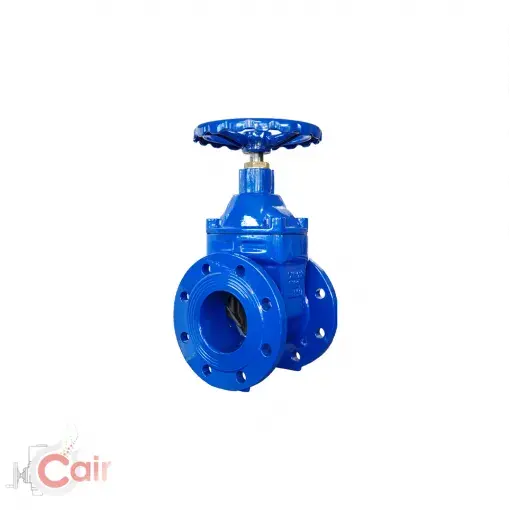The Importance of Installing Resilient Gate Valves for Industrial Operations
- cair euromatic
- Jun 7, 2023
- 3 min read
Gate valves play a crucial role in industrial operations, enabling efficient control of fluid flow. Among the different types of gate valves available, resilient gate valves have gained prominence due to their unique design and numerous benefits. We will discuss the importance of resilient gate valves in industrial operations, their advantages, applications, and considerations for selection and maintenance in this article.
A large portion of industrial operations depends on the efficient management of fluids such as water, gas, and oil. Ensure smooth operations and prevent potential hazards by controlling the flow of these fluids accurately and reliably. Resilient gate valves offer a reliable and efficient solution for this purpose, making them a vital component in various industrial settings.
Understanding Gate Valves
Before delving into the significance of resilient gate valves, it's important to have a clear understanding of gate valves in general. An open-and-close gate valve regulates fluid flow by controlling the opening and closing of a wedge-shaped disc. This design allows for a full bore, providing minimal obstruction to the flow path when fully open.
The Significance of Resilient Gate Valves
Resilient gate valves offer several key advantages over other types of gate valves, making them particularly suitable for industrial operations. The term "resilient" refers to the valve's ability to handle high-pressure systems while maintaining a tight seal. This resilience is achieved through the use of elastomeric materials, such as rubber, in the valve's sealing mechanism.
Benefits of Installing Resilient Gate Valves
Enhanced Performance and Efficiency
Resilient gate valves are known for their excellent performance and efficiency. The elastomeric seating mechanism provides a tight seal, minimizing leakage and pressure drops when the valve is closed. This design allows for precise control of fluid flow, enhancing overall system performance and reducing energy consumption.
Durability and Longevity
One of the key benefits of resilient gate valves is their durability and longevity. The elastomeric seals are highly resistant to corrosion, rust, and chemicals commonly found in industrial environments. This resistance ensures that the valves maintain their integrity over an extended period, reducing the need for frequent replacements and minimizing downtime.
Cost-Effectiveness
The long-term cost-effectiveness of resilient gate valves is another significant advantage. Their durability translates into reduced maintenance and replacement costs. Additionally, the efficient flow control provided by these valves helps optimize energy usage, resulting in lower operational expenses.
Safety and Reliability
In industrial operations, safety and reliability are paramount. Resilient gate valves offer both. The tight sealing provided by the elastomeric materials ensures that the valves can effectively isolate fluids and prevent leaks, minimizing the risk of accidents and maintaining a safe working environment. Moreover, the robust construction of resilient gate valves ensures their reliable performance even under demanding conditions.
Applications in Industrial Operations
Resilient gate valves find extensive applications in various industrial sectors. Water treatment plants, wastewater management systems, power generation facilities, oil and gas refineries, chemical processing plants, and irrigation systems commonly use them. These valves play a critical role in controlling fluid flow, allowing for efficient operation and optimal performance in these industries.
Factors to Consider when Choosing Resilient Gate Valves
When selecting resilient gate valves for industrial operations, several factors need to be considered. These include the intended application, system pressure and temperature, valve size, material compatibility, flow characteristics, and certifications. To ensure proper operation and compliance with industry standards, valves should be designed specifically for the application for which they are intended.

Installation and Maintenance
Optimal performance can be achieved by installing resilient gate valves properly and maintaining them regularly. During installation, it is crucial to ensure correct alignment, appropriate torque, and proper sealing. Routine maintenance should include inspections, cleaning, lubrication, and replacement of worn-out components. Following manufacturer guidelines and scheduling preventive maintenance can help maximize the lifespan and reliability of the valves.
Case Studies and Success Stories
Numerous industrial operations have witnessed significant improvements in their fluid management systems after installing resilient gate valves. A case study or success story from another industry can provide valuable insight into the advantages of using these valves and how they can be implemented. They demonstrate how resilient gate valves have positively impacted performance, efficiency, and overall operational success.
Future Trends in Gate Valve Technology
As technology continues to advance, gate valve designs and materials are evolving. Future trends in gate valve technology may include improved materials for increased durability, enhanced automation and remote control capabilities, advanced monitoring and diagnostic systems, and integration with smart industrial systems. Staying informed about these trends can help industrial operators make informed decisions when upgrading or expanding their fluid control systems.
Conclusion
Resilient gate valves offer a range of benefits that make them indispensable in industrial operations. Their enhanced performance, durability, cost-effectiveness, and safety features make them an ideal choice for fluid flow control. By selecting and maintaining resilient gate valves properly, industrial operators can optimise their processes, minimise downtime, and ensure safe and reliable operations.

Comments